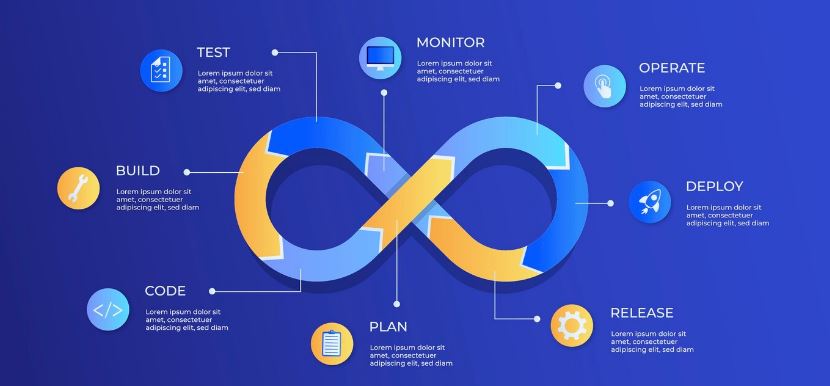
In today’s fast-paced digital landscape, businesses must adapt quickly to stay competitive. Two key technologies driving this agility are Cloud Computing and DevOps. These two paradigms, when used together, can significantly accelerate digital transformation, enabling organizations to innovate faster, reduce costs, and improve operational efficiency.
Understanding Cloud Computing and DevOps
Cloud Computing refers to the delivery of computing services—servers, storage, databases, networking, software, and more—over the internet (“the cloud”). It offers on-demand access to these resources, providing scalability, flexibility, and cost savings by eliminating the need for physical infrastructure.
DevOps is a set of practices that combines software development (Dev) and IT operations (Ops). It aims to shorten the development lifecycle and deliver high-quality software continuously. DevOps emphasizes collaboration, automation, continuous integration/continuous deployment (CI/CD), and monitoring.
The Synergy Between Cloud and DevOps
Scalability and Flexibility:
The cloud provides an elastic environment where resources can be scaled up or down based on demand. This scalability is essential for DevOps practices, which require flexible environments for development, testing, and deployment. With cloud services, teams can quickly provision the necessary infrastructure, ensuring that projects are not delayed by hardware constraints.
Automation and CI/CD:
DevOps relies heavily on automation to streamline processes such as testing, integration, and deployment. Cloud platforms offer a variety of tools and services that support automation. For instance, cloud-native CI/CD tools like AWS CodePipeline, Azure DevOps, and Google Cloud Build enable automated building, testing, and deployment of applications, accelerating the release cycle.
Collaboration and Communication:
Cloud-based tools facilitate better collaboration and communication among development and operations teams. Platforms like Slack, Microsoft Teams, and cloud-based project management tools enable seamless communication, file sharing, and task management, fostering a collaborative culture that is essential for successful DevOps practices.
Infrastructure as Code (IaC):
Cloud environments support IaC, a practice where infrastructure is managed and provisioned through code rather than manual processes. IaC tools like Terraform, AWS CloudFormation, and Azure Resource Manager allow teams to define and manage infrastructure in a version-controlled, automated, and repeatable manner. This aligns with DevOps principles of automation and consistency.
Monitoring and Logging:
Both DevOps and cloud computing emphasize the importance of monitoring and logging to maintain application performance and reliability. Cloud providers offer robust monitoring and logging services such as AWS CloudWatch, Azure Monitor, and Google Cloud Operations. These tools provide insights into system performance, enabling teams to detect and address issues proactively.
Security and Compliance:
Cloud providers offer a wide range of security features and compliance certifications, which help organizations meet regulatory requirements and protect their data. DevOps practices can integrate these cloud security tools into the CI/CD pipeline, ensuring that security checks are automated and continuously enforced throughout the development lifecycle.
Accelerating Digital Transformation
The combination of cloud and DevOps drives digital transformation by enabling organizations to:
Innovate Faster:
With the ability to quickly provision and scale infrastructure, development teams can experiment, iterate, and release new features rapidly. This agility fosters innovation and allows businesses to respond quickly to market changes.
Reduce Costs:
Cloud computing eliminates the need for expensive physical infrastructure and reduces operational overhead. Combined with the efficiency gains from DevOps practices, organizations can significantly lower their IT costs.
Improve Quality and Reliability:
Automated testing and continuous integration ensure that code changes are consistently validated, reducing the likelihood of bugs and improving software quality. Additionally, continuous monitoring helps maintain system reliability and performance.
Enhance Customer Experience:
Faster release cycles and higher-quality software result in a better user experience. Organizations can quickly deliver new features and improvements, meeting customer needs and expectations more effectively.
Streamline Operations:
DevOps practices and cloud services simplify and automate many operational tasks, freeing up IT staff to focus on strategic initiatives rather than routine maintenance.
Conclusion
The synergy between cloud computing and DevOps is a powerful catalyst for digital transformation. By leveraging the scalability, flexibility, and automation capabilities of the cloud, alongside the collaborative and efficient practices of DevOps, organizations can accelerate their journey toward digital maturity. This combination not only drives innovation and operational efficiency but also positions businesses to thrive in an increasingly digital world.